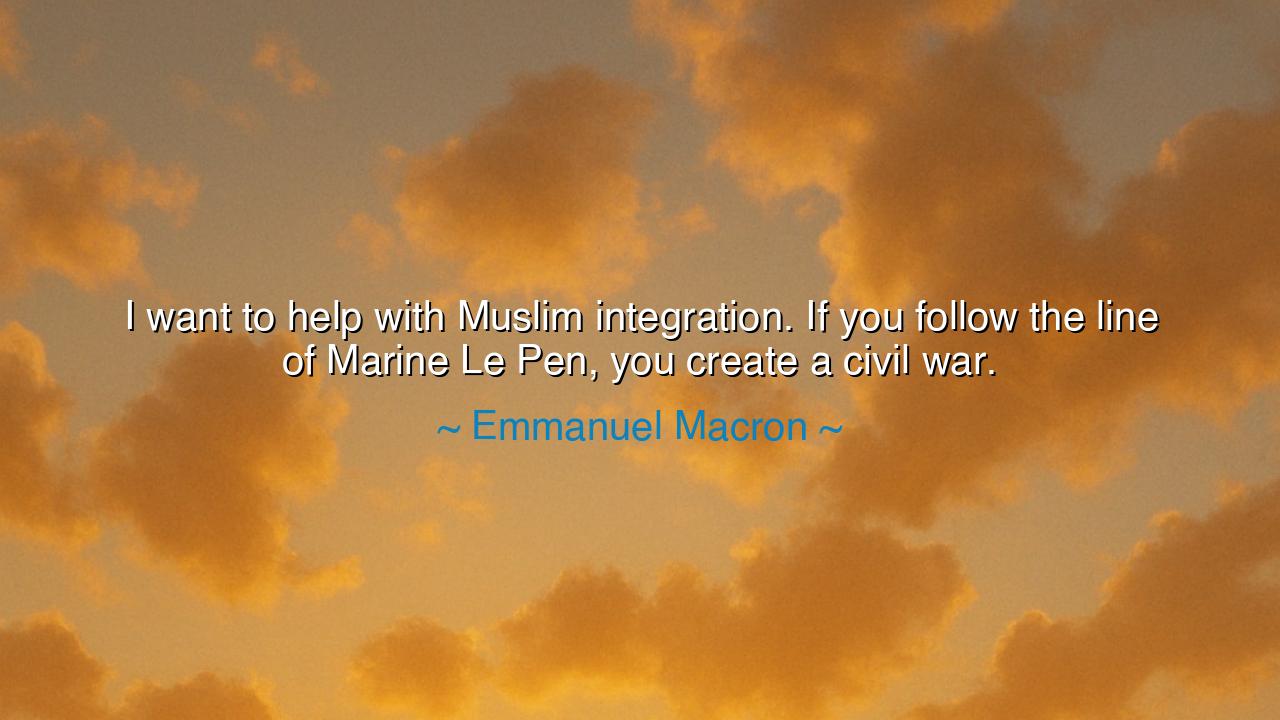
I want to help with Muslim integration. If you follow the line
I want to help with Muslim integration. If you follow the line of Marine Le Pen, you create a civil war.






The French president Emmanuel Macron, speaking amid the tensions of his nation, declared: “I want to help with Muslim integration. If you follow the line of Marine Le Pen, you create a civil war.” In this saying lies both a vision and a warning. Macron sets before his people two paths: one that seeks unity through integration and dialogue, and another that courts ruin through exclusion, division, and hatred. His words carry the ancient wisdom that when a society turns against its own, the enemy it creates is not foreign, but born from within.
The call for integration is the call for harmony in diversity. Macron recognizes that millions of Muslims dwell in France, woven into its cities, its schools, its workplaces. To integrate them is not to erase their faith, but to bind them into the larger fabric of the nation, where loyalty to France and respect for its values coexist with the richness of their traditions. But to reject them, to cast them out with suspicion, is to tear the fabric, to make of citizens strangers, and of neighbors adversaries.
The warning of civil war is not mere rhetoric. History has shown again and again that when nations fail to integrate those within their borders, when fear triumphs over fellowship, bloodshed follows. The wars of religion in France during the sixteenth century, when Catholics and Protestants turned upon one another, brought decades of slaughter to the land. Then, as now, suspicion of the “other” corroded the bonds of unity. Macron invokes this memory, for he knows that the flames of division can consume even the greatest nations if left unchecked.
Consider the tragedy of Yugoslavia in the 1990s. Once a single country of many peoples—Serbs, Croats, Bosniaks—it fractured when leaders stoked ethnic hatred instead of nurturing coexistence. Neighbors who had lived together for generations turned into enemies overnight. What followed was massacre, exile, and destruction. Macron’s words carry this lesson: when leaders embrace the path of exclusion, when they speak as Le Pen does, they do not merely divide opinion; they risk dividing a people into warring camps.
But the vision Macron offers is hopeful. To help with Muslim integration is to choose courage over fear, wisdom over prejudice. It is to build schools that teach equality, to defend the rights of every citizen, to promote dialogue instead of suspicion. Such work is difficult and slow, for it demands patience, generosity, and vigilance. Yet it is the work that prevents the poison of hatred from seeping into the roots of society. It is the labor that ensures the flag belongs to all who call the nation home.
For us who hear this teaching, the lesson is wider than France alone. In every land, there are differences of race, religion, language, and belief. The choice before every generation is the same: to treat difference as a threat, or to embrace it as a strength. Those who demonize others for political gain may stir applause for a season, but they sow the seeds of conflict. Those who labor for integration may face resistance, yet they lay the foundations of enduring peace.
Therefore, let us carry this wisdom into our lives. Do not allow the voices of division to harden your heart. Welcome the stranger, speak with those who are different, and seek always the common good. For if we build walls of suspicion, we invite civil war; but if we build bridges of respect, we preserve the peace of nations. Macron’s words remind us that unity is not born of sameness, but of shared purpose, and that a nation’s strength lies not in exclusion, but in the courage to stand together as one people.






GDGold D.dragon
Macron’s statement about creating civil war by rejecting integration is a stark reminder of the consequences of ignoring social cohesion. It also raises the question: How do we balance the desire for cultural preservation with the necessity of inclusivity in modern societies? Are we at risk of undermining social stability if we don’t engage in honest conversations about integration and coexistence?
NANhung Alice
The idea of creating civil war by refusing Muslim integration brings up a key point about the dangers of divisive politics. Macron seems to be warning that stoking fear and division only escalates the problem. But is it possible to integrate people into a society without compromising cultural values? What does true integration look like, and how can governments best address the concerns of both the majority and minority communities?
LTAnh Hong Ly Thi
Macron’s statement is a call for social harmony, but it also brings up the challenge of integrating diverse communities in a world of rising nationalism. If we follow figures like Marine Le Pen, we risk further alienating already vulnerable communities. How do we promote understanding between different groups without ignoring the concerns of those who fear cultural change? Is it possible to have open dialogue without fostering division?
LTThuy Le Thi
I think Macron’s comment reflects a deeper concern about the rise of far-right ideologies in Europe. By opposing the integration of Muslim communities, we risk creating an environment of tension and fear. How do we address the fears of those who oppose integration while ensuring that we are building a truly inclusive society? Can a society ever truly integrate without facing these kinds of challenges?
NTNguyen Ngoc Trinh
Macron's warning about creating civil war if we follow extremist lines is thought-provoking. It seems like he's highlighting the danger of fueling division rather than fostering inclusion. But how much responsibility do governments have in ensuring that Muslim communities are integrated successfully into society? And is there a way to achieve this without creating a backlash from other groups within the population?